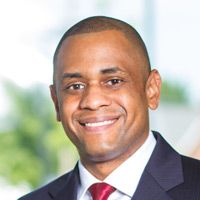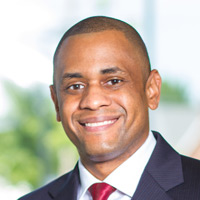If You Want to Retire Comfortably, It Isn't All About Investing
Preparing for what happens AFTER you finish building your nest egg and actually retire may be trickier and more important than all the saving and investing you did to get there.


Profit and prosper with the best of Kiplinger's advice on investing, taxes, retirement, personal finance and much more. Delivered daily. Enter your email in the box and click Sign Me Up.
You are now subscribed
Your newsletter sign-up was successful
Want to add more newsletters?

Delivered daily
Kiplinger Today
Profit and prosper with the best of Kiplinger's advice on investing, taxes, retirement, personal finance and much more delivered daily. Smart money moves start here.

Sent five days a week
Kiplinger A Step Ahead
Get practical help to make better financial decisions in your everyday life, from spending to savings on top deals.

Delivered daily
Kiplinger Closing Bell
Get today's biggest financial and investing headlines delivered to your inbox every day the U.S. stock market is open.

Sent twice a week
Kiplinger Adviser Intel
Financial pros across the country share best practices and fresh tactics to preserve and grow your wealth.

Delivered weekly
Kiplinger Tax Tips
Trim your federal and state tax bills with practical tax-planning and tax-cutting strategies.

Sent twice a week
Kiplinger Retirement Tips
Your twice-a-week guide to planning and enjoying a financially secure and richly rewarding retirement

Sent bimonthly.
Kiplinger Adviser Angle
Insights for advisers, wealth managers and other financial professionals.

Sent twice a week
Kiplinger Investing Weekly
Your twice-a-week roundup of promising stocks, funds, companies and industries you should consider, ones you should avoid, and why.

Sent weekly for six weeks
Kiplinger Invest for Retirement
Your step-by-step six-part series on how to invest for retirement, from devising a successful strategy to exactly which investments to choose.
Here’s a little secret, just between you and me.
A lot of people — maybe even most people — can be successful DIYers through the early years of their investing life. Unless you’re a high earner, have a high net worth or have some other special planning needs, you probably can figure out how much you want to contribute and how to allocate your assets. (If you can’t or don’t want to, you should, by all means, seek professional guidance — even if it’s only on specific occasions, or to tap into some good investing advice.)
However, I’m going to warn you: When you’re ready to wrap up the accumulation phase and move on to preservation and distribution, things could get a little trickier. OK, a lot trickier. Using a DIY approach may not be the best choice as the focus shifts from making and saving as much money as you can to living off that money for decades in retirement.
From just $107.88 $24.99 for Kiplinger Personal Finance
Become a smarter, better informed investor. Subscribe from just $107.88 $24.99, plus get up to 4 Special Issues

Sign up for Kiplinger’s Free Newsletters
Profit and prosper with the best of expert advice on investing, taxes, retirement, personal finance and more - straight to your e-mail.
Profit and prosper with the best of expert advice - straight to your e-mail.
One of the mistakes I see when prospective clients come to my office — retirees and pre-retirees alike — is that even when they do go for financial advice, they don’t necessarily contact a retirement professional. Which means they usually don’t have a comprehensive retirement plan. They sit down and tell me they’re pretty happy with their investments because they had a 7% return the year before. But when I ask them about their income plan, what they’re doing about taxes and health care, and if they have a will, they get quiet.
“I guess we never thought much about any of those things,” they say. “Our adviser just helps us pick stocks.”
So, what they’re telling me is that instead of taking the time to understand their needs, someone looked at their investments and said he or she could make them more money. That’s it.
That’s great when you’re young, but not so much when you need to help safeguard your portfolio from risks in retirement. That’s why you need a comprehensive financial plan that includes:
1. A solid income plan.
You want to make sure you have reliable income streams in retirement, so you can cover your expenses. That means maximizing pension and Social Security benefits for you and your spouse. You also need to know what will happen to the surviving spouse’s income when one of you dies and the lower Social Security payment (and possibly that pension) goes away. You should also consider how your expenses might change over the years, as your lifestyle changes. Then there’s inflation. The current inflation rate is 2.3%, and though there’s no predicting the future, you can be reasonably sure that the $100 in your wallet won’t buy nearly as many groceries even 10 years from now.
2. An investment plan.
In retirement, it’s important to reduce the potential for a big loss in your portfolio. You simply won’t have time to recover the way you did when you were younger. I like to take a “three-bucket” approach. Using a couple with $1 million saved, here’s what that looks like:
- Bucket One is for safety. Our couple is extremely conservative, so we’ll set aside $100,000 for their emergency fund.
- Bucket Two is for income. Let’s say they need $5,000 a month to cover their expenses, but their Social Security and pension payments equal only $3,000. They’ll need to fill that income gap, so we’ll set aside $500,000 in conservative investments for them to draw from.
- Bucket Three is for growth. This bucket should only be created once our couple is sure their safety and income needs have been met. In this case, they have $400,000 left to invest for the long term. They can take a little more risk with this money because they won’t have to touch it until they’re deep into their retirement. They may have to tap into this at a later date due inflation on normal necessities, especially health care. Even though they may be spending $5,000 a month today, the need will increase to $7,500 a month in 10 years considering an average 3% cost of living adjustment.
3. A tax-efficient plan.
If you have most of your nest egg in a 401(k) or traditional IRA, you need to remember that you haven’t paid taxes on that money yet — and Uncle Sam wants his cut. Your goal is to pay him what’s fair, but no more. So, your tax-efficient plan might include, for example, taking advantage of the recent tax reforms, which delivered new brackets, lower rates and a bigger standard deduction that should be in place until at least Dec. 31, 2025. If you’re older than 59½ and can take money from your 401(k) without a penalty, this might be the right time to convert some of that money into a Roth account and pay taxes on it now instead of later. And if you’re younger than 59½ and have a traditional IRA, you could convert some of the funds in it to a Roth IRA. Your financial adviser can help you run the numbers and come up with other smart strategies.
4. A health care plan.
Even those who have an otherwise well-thought-out plan tend to overlook health care planning. But if you require long-term care, for example, the cost could be devastating. According to the 2018 Genworth Cost of Care Survey, the national median cost for a semi-private room in a nursing home is $7,441 per month. That can quickly drain a portfolio. If you retire before 65 and will lose employer health coverage, you also need to think about how you’ll pay for medical costs until you’re eligible for Medicare.
5. A legacy plan.
Most people say they want to leave something behind for their loved ones, but few have given much thought to how they’ll do it — or what the tax consequences will be for their beneficiaries. Even if you’re already working with an estate attorney, you should be incorporating this information into your overall financial plan.
All five of these points should work together to form one comprehensive plan that puts you in a comfortable position for the short term and long term.
It sounds complicated, but your financial adviser should be able to analyze what you have and tell you what’s in good order, then outline the actions necessary to help what isn’t working. If your financial professional only wants to talk about stocks, bonds and mutual funds, and you’re close to retirement, look for a financial professional who could provide a plan that helps move you forward from the day you meet through the rest of your retirement years.
Kim Franke-Folstad contributed to this article.
Profit and prosper with the best of Kiplinger's advice on investing, taxes, retirement, personal finance and much more. Delivered daily. Enter your email in the box and click Sign Me Up.

Marvin Mitchell is an Investment Adviser Representative and founder of Compass Retirement Solutions, LLC (www.compassretirementsolutions.com). He is the host of "Re-thinking Retirement" on NewsTalk 97.1 in St. Louis, Missouri, and also serves as a speaker, coach and trainer.
-
 Dow Leads in Mixed Session on Amgen Earnings: Stock Market Today
Dow Leads in Mixed Session on Amgen Earnings: Stock Market TodayThe rest of Wall Street struggled as Advanced Micro Devices earnings caused a chip-stock sell-off.
-
 How to Watch the 2026 Winter Olympics Without Overpaying
How to Watch the 2026 Winter Olympics Without OverpayingHere’s how to stream the 2026 Winter Olympics live, including low-cost viewing options, Peacock access and ways to catch your favorite athletes and events from anywhere.
-
 Here’s How to Stream the Super Bowl for Less
Here’s How to Stream the Super Bowl for LessWe'll show you the least expensive ways to stream football's biggest event.
-
 How to Add a Pet Trust to Your Estate Plan: Don't Leave Your Best Friend to Chance
How to Add a Pet Trust to Your Estate Plan: Don't Leave Your Best Friend to ChanceAdding a pet trust to your estate plan can ensure your pets are properly looked after when you're no longer able to care for them. This is how to go about it.
-
 Want to Avoid Leaving Chaos in Your Wake? Don't Leave Behind an Outdated Estate Plan
Want to Avoid Leaving Chaos in Your Wake? Don't Leave Behind an Outdated Estate PlanAn outdated or incomplete estate plan could cause confusion for those handling your affairs at a difficult time. This guide highlights what to update and when.
-
 I'm a Financial Adviser: This Is Why I Became an Advocate for Fee-Only Financial Advice
I'm a Financial Adviser: This Is Why I Became an Advocate for Fee-Only Financial AdviceCan financial advisers who earn commissions on product sales give clients the best advice? For one professional, changing track was the clear choice.
-
 I Met With 100-Plus Advisers to Develop This Road Map for Adopting AI
I Met With 100-Plus Advisers to Develop This Road Map for Adopting AIFor financial advisers eager to embrace AI but unsure where to start, this road map will help you integrate the right tools and safeguards into your work.
-
 The Referral Revolution: How to Grow Your Business With Trust
The Referral Revolution: How to Grow Your Business With TrustYou can attract ideal clients by focusing on value and leveraging your current relationships to create a referral-based practice.
-
 This Is How You Can Land a Job You'll Love
This Is How You Can Land a Job You'll Love"Work How You Are Wired" leads job seekers on a journey of self-discovery that could help them snag the job of their dreams.
-
 65 or Older? Cut Your Tax Bill Before the Clock Runs Out
65 or Older? Cut Your Tax Bill Before the Clock Runs OutThanks to the OBBBA, you may be able to trim your tax bill by as much as $14,000. But you'll need to act soon, as not all of the provisions are permanent.
-
 The Key to a Successful Transition When Selling Your Business: Start the Process Sooner Than You Think You Need To
The Key to a Successful Transition When Selling Your Business: Start the Process Sooner Than You Think You Need ToWay before selling your business, you can align tax strategy, estate planning, family priorities and investment decisions to create flexibility.